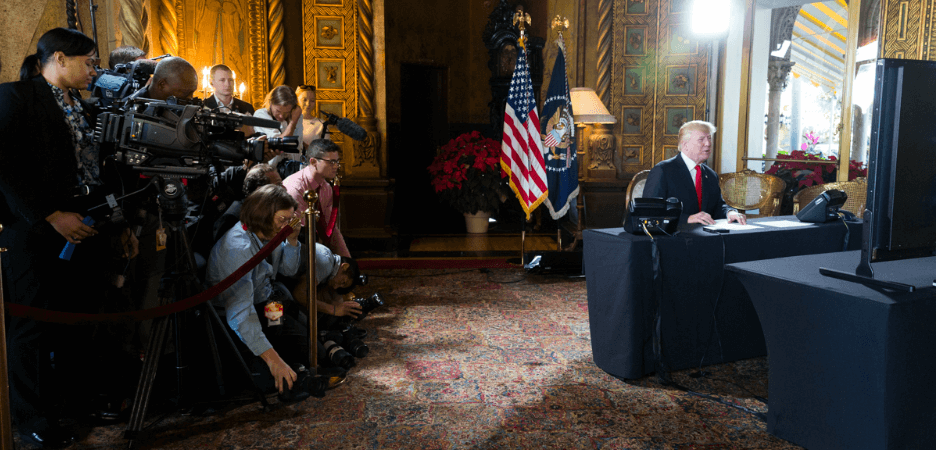In the post-truth world, it is unlikely that the questions raised regarding Michael Wolff’s exposé of Donald Trump will ever be effectively answered.
It can be said without any pretense that Michael Wolff, the author of Fire and Fury: Inside the Trump White House, has conjured a reaction — one of both praise and vituperation — that is quite rare and unusual for a book these days. Writers often labor in the dark for undignified wages for much, if not their entire careers. Wolff surely must be exultant: The book has already sold over a million copies and has been out of stock in many bookstores across the country.
Praise is much deserved if you are bewildered at how a journalist managed to gain such easy admission to the White House and its insider wheelings and dealings. It is safe to suggest that the reason lies with the president’s own incompetence and that of his inner circle. Critics, on the other hand, have been practically unanimous in their discontent. Indeed, Wolff’s unglamorous portrait of the president and his administration does not read like the solemn political journalism in the tradition of Bob Woodward and Carl Bernstein. There are misattributions, misspellings and deeply erroneous claims throughout the entire book.
In one instance, where Wolff lists high profile names who attended a breakfast at the Four Seasons in Washington D.C., multiple errors were found: Political strategist Hilary Rosen’s name was misspelled, the commerce secretary Wilbur Ross was misidentified as the labor secretary nominee and Washington Post reporter Mark Berman never attended the event, confused with lobbyist Mike Berman. Then there are the numerous quotations throughout the book denied by those whom they have been ascribed to including, former UK Prime Minster Tony Blair, investor Tom Barrack, Trumps’ former deputy chief of staff Kate Walsh and editor-in-chief of American Vogue Anna Wintour.
Other claims Wolff has made about the president include probings of his mental condition. He writes: “Everybody was painfully aware of the increasing pace of his repetitions. It used to be inside of 30 minutes he’d repeat, word-for-word and expression-for-expression, the same three stories — now it was within 10 minutes.” There are also claims about Trump and his wife sleeping in separate bedrooms, his excessive television habits and his grave fear of being poisoned.
Last Wednesday, the author was asked to address these errors on ABC’s The View. “You know, Michael, your credibility is being questioned,” Meghan McCain, one of the show’s hosts, told him. Wolff abruptly replied, “Let’s remember who my credibility is being questioned by.” In the same interview, when pressed, Wolff admitted that the dinner party he attended with the late Roger Ailes, former head of Fox News, and White House chief adviser Stephen Bannon was off the record. McCain responded with: “This is why people hate journalists, by the way, this is why I don’t believe in the concept of off the record.”
It has been revealed long ago that Wolff maybe a connoisseur of deception. In 2004, there was Michelle Cottle’s story for The New Republic in which she writes that “Much to the annoyance of Wolff’s critics, the scenes in his columns aren’t recreated so much as created — springing from Wolff’s imagination rather than from actual knowledge of events.” She continues: “Even Wolff acknowledges that conventional reporting isn’t his bag. Rather, he absorbs the atmosphere and gossip swirling around him at cocktail parties, on the street, and especially during those long lunches at Michael’s.”
It will be unlikely that the book will convince members of either the anti-Trump or the pro-Trump camps to change their mind about the president and his circle. If anything, it will only harden their conviction that Trump is either a man unqualified in morality and merit to run the country or that the media is an impenetrable force ready to evade journalistic standards in order to damage the president’s reputation by whatever means necessary. But the disconcerting reality is that both of these opposing sides have withdrawn into themselves. Asserting one’s loyalty to the group has become far more important than developing ideas.
David Brooks has diagnosed this danger for The New York Times: “The anti-Trump movement suffers from insularity. Most of the people who detest Trump don’t know anybody who works with him or supports him. And if they do have friends and family members who admire Trump, they’ve learned not to talk about this subject.”
Paradoxically, it is a book, above all else, that may well cause the deepest pang in the president’s back. It has been retold again by Wolff that Trump is a man who rarely reads. Journalists will continue to judge the accuracy of Wolff’s exposé, but the more significant danger perhaps has been the response by the president himself. Shortly before its release, a cease and desist letter was sent to Bannon and Wolff by Trump’s lawyer, a first in presidential history. Bannon has yet to dispute any of Wolff’s account.
Trump has normalized a political culture that blurs the boundaries of truth, and its effects will be felt for generations. We’ll never know the extent of the mistakes of Wolff’s book, but all are aware of the president’s proclivity to brand his critics as fake news. Today, our debates have been reduced to vast oversimplifications and mediocre reporting on all sides. Wolff’s book is another product of this reality. But books, by their very nature, are independent enterprises. If democracy is to be protected, then it is imperative that books even as dubious as Michael Wolff’s are too.
The views expressed in this article are the author’s own and do not necessarily reflect Fair Observer’s editorial policy.
Photo Credit: The White House
Support Fair Observer
We rely on your support for our independence, diversity and quality.
For more than 10 years, Fair Observer has been free, fair and independent. No billionaire owns us, no advertisers control us. We are a reader-supported nonprofit. Unlike many other publications, we keep our content free for readers regardless of where they live or whether they can afford to pay. We have no paywalls and no ads.
In the post-truth era of fake news, echo chambers and filter bubbles, we publish a plurality of perspectives from around the world. Anyone can publish with us, but everyone goes through a rigorous editorial process. So, you get fact-checked, well-reasoned content instead of noise.
We publish 2,500+ voices from 90+ countries. We also conduct education and training programs
on subjects ranging from digital media and journalism to writing and critical thinking. This
doesn’t come cheap. Servers, editors, trainers and web developers cost
money.
Please consider supporting us on a regular basis as a recurring donor or a
sustaining member.
Will you support FO’s journalism?
We rely on your support for our independence, diversity and quality.







